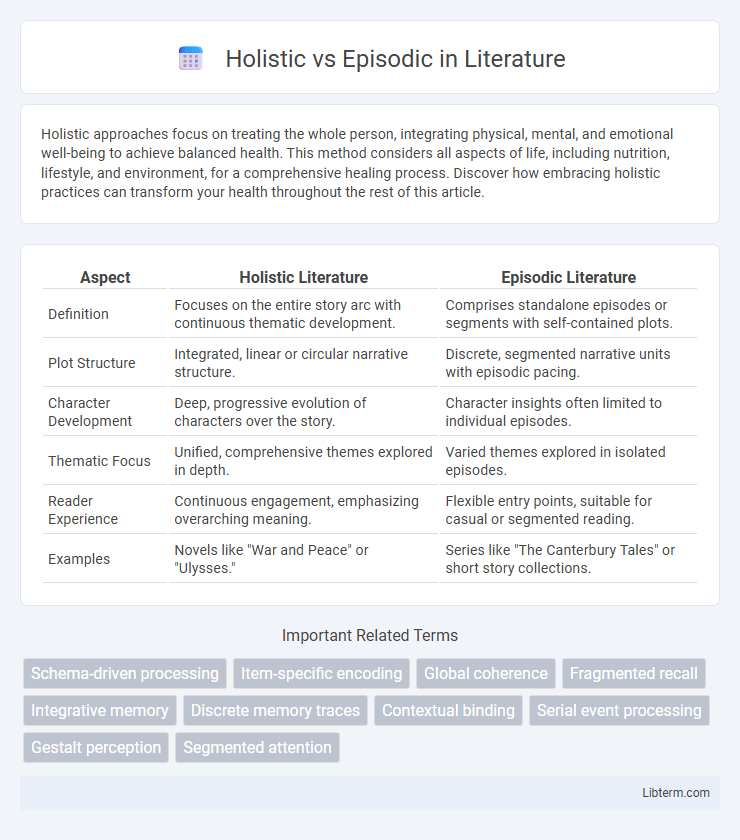Holistic approaches focus on treating the whole person, integrating physical, mental, and emotional well-being to achieve balanced health. This method considers all aspects of life, including nutrition, lifestyle, and environment, for a comprehensive healing process. Discover how embracing holistic practices can transform your health throughout the rest of this article.
Table of Comparison
| Aspect | Holistic Literature | Episodic Literature |
|---|---|---|
| Definition | Focuses on the entire story arc with continuous thematic development. | Comprises standalone episodes or segments with self-contained plots. |
| Plot Structure | Integrated, linear or circular narrative structure. | Discrete, segmented narrative units with episodic pacing. |
| Character Development | Deep, progressive evolution of characters over the story. | Character insights often limited to individual episodes. |
| Thematic Focus | Unified, comprehensive themes explored in depth. | Varied themes explored in isolated episodes. |
| Reader Experience | Continuous engagement, emphasizing overarching meaning. | Flexible entry points, suitable for casual or segmented reading. |
| Examples | Novels like "War and Peace" or "Ulysses." | Series like "The Canterbury Tales" or short story collections. |
Understanding Holistic and Episodic Approaches
Holistic approaches emphasize comprehensive understanding by integrating multiple perspectives and factors in a system or experience, capturing the interconnectedness of elements over time. Episodic approaches focus on discrete, individual events or moments, analyzing them in isolation to identify specific patterns or outcomes. Understanding these methods aids in selecting the appropriate framework for research, therapy, or decision-making depending on the complexity and continuity of the subject matter.
Key Differences: Holistic vs Episodic
Holistic memory processes information as a unified whole, capturing entire scenes or experiences, while episodic memory involves recalling specific events anchored in time and context. Holistic cognition emphasizes overall patterns and relationships, contrasting with episodic cognition's focus on distinct and sequential episodes. These key differences shape how individuals perceive, store, and retrieve information in both cognitive psychology and artificial intelligence.
Core Principles of Holistic Models
Holistic models emphasize the integration of multiple factors, viewing elements as interconnected components within a larger system rather than isolated incidents. Core principles include comprehensiveness, continuity, and context-awareness, ensuring that analysis incorporates emotional, cognitive, social, and environmental dimensions simultaneously. This approach contrasts with episodic models that analyze discrete events independently, often missing the broader influences shaping behavior and outcomes.
Foundations of Episodic Methods
Episodic methods in reinforcement learning rely on the storage and retrieval of specific past episodes or experiences to inform decision-making, enabling agents to generalize from limited data by recalling entire trajectories rather than aggregated statistics. These methods build on key foundations such as episodic memory systems, which capture sequences of states, actions, and rewards, allowing for rapid learning and adaptation in complex environments. The integration of episodic memory with reinforcement learning algorithms enhances sample efficiency and supports learning in sparse reward settings by leveraging direct past experiences.
Benefits of Holistic Strategies
Holistic strategies provide comprehensive insights by integrating multiple data sources, offering a complete understanding of customer behavior and long-term trends. This approach enhances decision-making accuracy and fosters sustainable growth through continuous optimization across all touchpoints. Businesses adopting holistic methods benefit from improved customer retention, increased revenue, and a more resilient market presence.
Advantages of Episodic Approaches
Episodic approaches offer distinct advantages in flexibility and adaptability, enabling systems to learn from discrete experiences without requiring continuous context retention. They allow for rapid updating and refinement of knowledge based on specific events, enhancing responsiveness to new information. Episodic memory structures support personalized learning and decision-making by isolating individual episodes, improving accuracy in recalling and applying relevant data.
Challenges and Limitations: Holistic Perspective
The holistic perspective faces challenges including complexity in integrating diverse data sources and difficulty in isolating specific causative factors within interconnected systems. Limitations arise from the potential for overwhelming information, making it harder to identify actionable insights and leading to analysis paralysis. This approach also demands significant computational resources and interdisciplinary expertise, which can restrict its practical application.
Drawbacks of Episodic Thinking
Episodic thinking often leads to decision-making that overlooks long-term consequences, causing fragmented understanding and inconsistent outcomes. It limits the ability to recognize patterns across events, reducing foresight and strategic planning effectiveness. This narrow focus can result in missed opportunities for sustainable growth and adaptation in complex environments.
When to Use Holistic or Episodic Approaches
Holistic approaches are best used when analyzing systems with complex interdependencies and long-term impacts, such as ecosystem management or organizational development, where understanding the entire context is crucial. Episodic approaches suit scenarios requiring detailed examination of discrete events or incidents, like clinical case studies or historical event analysis, enabling focused investigation and targeted interventions. Choosing between holistic and episodic methods depends on whether the objective prioritizes comprehensive integration or isolated event-specific clarity.
Integrating Holistic and Episodic for Optimal Outcomes
Integrating holistic and episodic approaches enhances overall decision-making by combining comprehensive context awareness with detailed event-specific insights. Holistic strategies emphasize the broader environment and continuous patterns, while episodic methods focus on individual occurrences and discrete data points. Leveraging both perspectives creates a dynamic framework that optimizes outcomes through balanced, context-rich, and precise analysis.
Holistic Infographic

 libterm.com
libterm.com